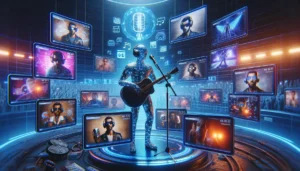Top Three Legal Issues in the Entertainment Industry in 2024
The entertainment industry continues to evolve rapidly, especially as new technologies and platforms reshape how content is created, distributed, and consumed. Here’s a look at the top three legal issues facing the entertainment industry in 2024, based on what we’ve seen in the first quarter and what’s likely to evolve into litigation throughout this year and into the next:
- Rights of Publicity and Privacy in Digital Spaces: The proliferation of new technologies like AI voice cloning, NFTs bearing celebrity likenesses, and virtual reality environments has opened up new fronts for the misuse of identities. We have already seen numerous instances of famous musicians’ voices showing up in “cover songs” that were not created by human musicians at all, nor authorized by any publishers or labels. AI tools have made it extremely easy for a user to enter “give me ‘Jolene,’ but have Willie Nelson’s voice” and get a result that sounds…exactly like that. The problem is: it’s not Willie singing – he didn’t agree to the use of his voice, nor did he get paid for his time or services. On top of that, as a “cover” that was not produced or released through typical music industry channels, not even Dolly is getting paid for this song as the songwriter. Individuals in the entertainment sector must be vigilant in protecting their rights of publicity against unauthorized use of their name, image, or likeness, especially in digital spaces where it is extremely easy for content to be copied, shared, and distributed widely before there’s a chance to shut it down.
 IP Enforcement and Brand Protection in Emerging Technologies: With the advent and proliferation of VR and AR environments and platforms, blockchain, and the expansion of Meta’s platforms as sites for commerce, entertainment brands face new challenges in protecting their intellectual property. Traditional online IP enforcement tools like the DMCA often do not suffice, especially when infringers can easily make spurious counter-claims and force the rights owner to initiate a lawsuit to resolve the DMCA claim. Rights owners need to consider updated strategies and policies to safeguard IP rights and combat consumer fraud in these novel platforms.
IP Enforcement and Brand Protection in Emerging Technologies: With the advent and proliferation of VR and AR environments and platforms, blockchain, and the expansion of Meta’s platforms as sites for commerce, entertainment brands face new challenges in protecting their intellectual property. Traditional online IP enforcement tools like the DMCA often do not suffice, especially when infringers can easily make spurious counter-claims and force the rights owner to initiate a lawsuit to resolve the DMCA claim. Rights owners need to consider updated strategies and policies to safeguard IP rights and combat consumer fraud in these novel platforms.- Generative AI in the Creative Process: The role of generative AI (“GenAI” for short) in content creation raises significant copyright concerns. While the US Copyright Office has made clear that human authorship is still required for copyright protection, there is absolutely a possibility of copyright protection for works created by GenAI but modified or heavily supervised by humans. The intricacies of distinguishing between human and AI contributions in the creative process will continue to be a legal battleground. The other major issue for GenAI is the use of content for training GenAI models: many companies operating in this space, such as OpenAI, got into hot water in 2023 when it became clear that many copyright-protected materials were used in the training of GenAI models. While some AI developers claim fair use in this context, not a single rights owner agrees with that assessment. Massive quantities of music, films, literature, and other material are necessary for AI models to “learn” their “craft” correctly. Many artist-friendly tech entrepreneurs in this space (some of them artists themselves) are now very vocal about committing to only using public domain material for training libraries. However, verification of these assertions is challenging, and many artists are skeptical to take the word of the companies that are positioned to upend the creative economy.
Holon Law Partners has 100+ years of experience combined guiding clients through complex cases and legal intricacies. Our approach is empathetic, customized, and client-centered with a focus on you and your unique business needs. To schedule a consultation with us, call our team at (866) 372-0726 or email us at: info@holonlaw.com.
References:
- The National Law Review. “10 Legal Challenges for Media and Entertainment Companies in 2023.” Accessed at: https://www.natlawreview.com/article/10-legal-challenges-media-and-entertainment-companies-2023
- ArentFox Schiff. “The Generative AI Revolution: Key Legal Considerations for the Media & Entertainment Industry.”
- 2024 media and entertainment industry trends | EY – US
Accessed at: https://www.ey.com/en_us/tmt/2023-media-and-entertainment-industry-outlook on 15 Dec 2023. - Reed Smith publishes guide exploring AI in the entertainment and media industry | News | Reed Smith LLP
Accessed on 22 June 2023. - Entertainment Law in the US – definition, types, and examples | Lawrina
Accessed at: https://www.lawrina.org/blog/entertainment-law/ . - Media and Entertainment Industry Gets a Turn in DOJ-FTC Antitrust Hot Seat | Insights | Holland & Knight.
- The future of generative AI in the entertainment industry: Legal considerations and new opportunities | Miller Thomson LLP | Canadian business law firm
Accessed at: https://www.millerthomson.com/en/publications/communiques-and-updates/technology-law-alert/march-29-2023-law/the-future-of-generative-ai-in-the-entertainment-industry-legal-considerations-and-new/ on 29 March 2023.



